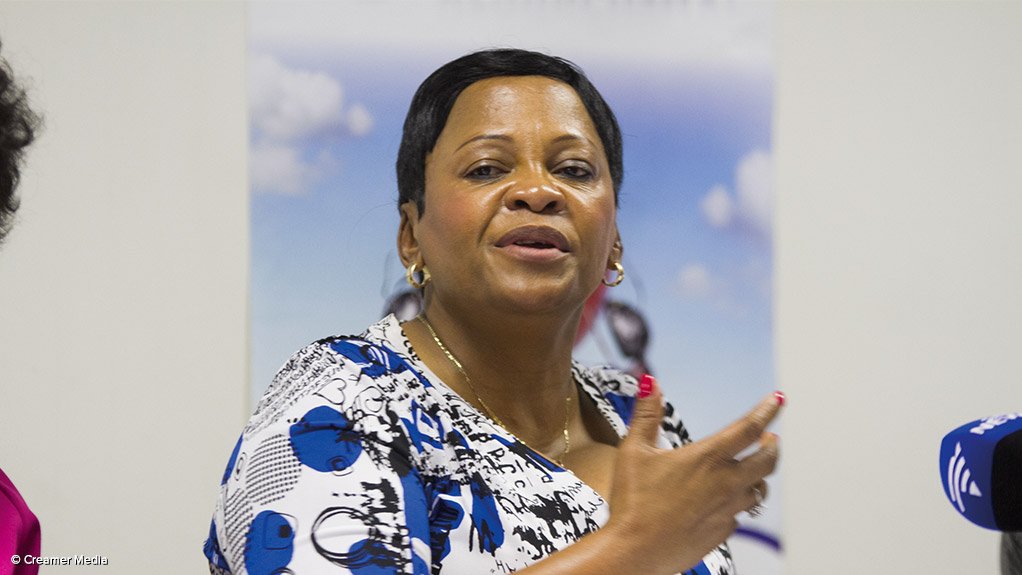Water and Sanitation Minister Nomvula Mokonyane said Western Cape Premier Helen Zille and Democratic Alliance leader Mmusi Maimane are looking for a scapegoat on the water crisis.
"We will not be drawn into petty political squabbles while the people and economy of the Western Cape are on the verge of a possible water supply blackout," Mokonyane said on Wednesday.
She was responding to Zille, Maimane and the City of Cape Town's suggestions that the city had received little to no financial support from her department.
Mokonyane accused Zille and Maimane of absolving themselves of their responsibilities in the management of the water crisis.
She said they were attempting to "create scapegoats and shift the blame on the seriousness of the water crisis".
On Wednesday during a public meeting at the Joseph Stone Auditorium in Athlone, both Zille and Maimane said the responsibility to provide bulk water lay with the national department.
'No funds at local government level'
"Many people I speak to ask why more dams have not been built.
"I want to make something very clear on the bulk supply of water. There is a misconception that this is the role of a city and it is a local government responsibility.
"Let me be very clear. It is not. It is the constitutional mandate of national government to deliver water to all municipalities," Maimane said.
He explained that the manner in which the City purchased bulk water was similar to the way it purchased bulk electricity from Eskom.
"And therefore the funding for any additional water supply falls within national government. Local governments simply don't have those kinds of funds or the mandate for bulk water provision," he said.
In a question and answer session after Maimane's address, the city's mayoral committee member for water affairs Xanthea Limberg said the national department had not provided the city with any financial support.
National government 'out of touch'
"What we did receive was R20-million from the Department of Co-operative Governance. This R20-million was allocated with the condition that we only utilise this money for underground water resources such as aquifers.
"And obviously if you look at the cost of digging into the aquifers that the City has identified, it really is only a small portion of the overall cost of this type of augmentation scheme."
Zille, said she had received a message "in the middle of December" which said a team in the national department was going to put a desalinator at the V&A Waterfront which would be installed by "this and this contractor and it is going to produce two megalitres [of water] a day".
"And for those of us preparing for this crisis... it shows you how fundamentally out of touch the national department is I'm afraid. And that is not pointing fingers or bickering, just stating a fact because number one: we are already putting in a desalinator at the Waterfront... and it will be producing two megalitres of water in itself," she said.
Mokonyane hit back, saying several meetings were held with the City, the provincial ministry of local government, and environment and development planning departments in the Western Cape to manage and mitigate the effects of the drought on water availability for the province.
"Several of the proposals emanating from these engagements have since been pursued, including desalination options, the recycling of water, further increases in restrictions, clearing of canals, dredging of dams and expediting the implementation of the Berg River-Voelvlei augmentation scheme," she said.
Day Zero moved forward
Mokonyane said urgency was required in assisting the City of Cape Town to avoid Day Zero through increased public awareness and enforcement of compliance with water use restrictions.
"No amount of politicking and [scapegoating] will do away with the imminent water blackout we face in the Western Cape if we fail to act responsibly."
Dam levels in the Western Cape are currently at 26.5%.
The City of Cape Town has previously said that when storage reaches 13.5% it will turn off most taps, leaving only vital services with access to water.
Deputy Mayor Ian Neilson on Tuesday announced that Day Zero had been brought forward by nine days, to April 12, due to a drop in dam levels.
Mokonyane said the department had successfully saved several provinces from devastating drought over the last three years and would do so for the Western Cape as well.
"Defeating Day Zero has been and continues to be our main priority and the work that has been done over the last year will continue with increased urgency to ensure we guarantee access to water for citizens," she said.
EMAIL THIS ARTICLE SAVE THIS ARTICLE
To subscribe email subscriptions@creamermedia.co.za or click here
To advertise email advertising@creamermedia.co.za or click here











